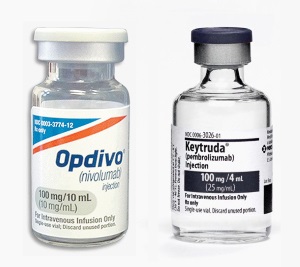Researchers unveiled the world’s first real-world data to show how immunotherapies were effective and safe to treat liver cancer.

They reported two studies using real-world data on Opdivo (ingredient: nivolumab) and Keytruda (pembrolizumab) during the European Association for the Study of the Liver’s “Liver cancer – Systemic treatment and immunotherapy” session, at the International Liver Congress in Vienna, Austria, Saturday.
Both drugs’ efficacy and safety profiles were in line with those displayed in the phase-2 trials and well tolerated even in those heavily pretreated and patients with moderate Child-Pugh class B liver disease. The Child-Pugh score is used to assess the prognosis of chronic liver disease.
Nivolumab and pembrolizumab won conditional approval from the U.S. Food and Drug Administration for the second-line treatment of patients with hepatocellular carcinoma (HCC) who have previously received a tyrosine kinase inhibitor such as sorafenib.
The first real-world data came from 42 individuals with HCC who received Opdivo outside clinical trials in Spain.
After observing them for 13.5 months on average since the start of first-line treatment, their overall survival recorded 28.8 months.
Fifteen patients (46.8 percent) reported 25 adverse events, of which five were Grade 3-4, and one, Grade 5 (rejection after liver transplantation). Corticosteroids were used for the management of adverse events in five patients (15.6 percent).
“This study suggests that the safety profile of nivolumab, when used in clinical practice, is in line with that reported in clinical trials despite including patients outside of clinical trials,” said Dr. Leonardo Gomes da Fonseca at the Hospital Clinic of Barcelona, Spain, who reported the study.
The second real-world data was from 65 patients who received Opdivo (34 persons) and Keytruda (31) between 2015 and 2018 at six centers in Austria and Germany.
The overall response rate stood at 12 percent, and disease control rate, 49 percent. Thirty-five patients (54 percent) reported radiological disease progression and 36 (55 percent) died during the follow-up.
The median time to progression was 5.5 months, median progression-free survival, 4.6 months, and median overall survival, 11 months.
The most common adverse events were infections, rash, itching, fatigue, diarrhea, and hepatitis. The safety results were similar between Child-Pugh A and B patients but, median overall survival was shorter in Child-Pugh B patients.
Dr. Mattias Pinter from the Medical University of Vienna, Austria, who presented the study said, “Immunotherapy with nivolumab or pembrolizumab was well tolerated in patients with advanced HCC, including those with Child-Pugh stage B disease and those who had been heavily pretreated.”
He added that efficacy was comparable to that reported in phase-2 studies.

